Etymology and the Magic of Words
No, not entomology the study of insects. Etymology is the study of the true meaning of words. To see what the word was created to represent. Words are created with a purpose to express meaning about something. Words are imbued with a meaning. Words symbols are created to reflect and represent aspects of being in reality, or something we imagine in our minds.
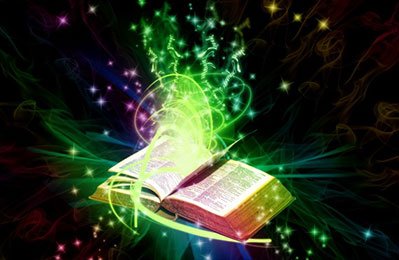
Power of Words (source unknown)
Word symbols are important. They are used to represent, reference and correspond to something. We can invent words to reference something real that actually exists in objective existence, but also something imagined that only "exists" in our subjective consciousness. Just because something can be imagined in the "light" of our mind's eye, does not necessarily mean it exists in the light of reality. Perception is not de facto reality. Perception in consciousness does not dictate an automatic reference for existence in reality.
To know the meaning of a word is to know what it represents in reality. Abstract language is mostly arbitrary at first, but not the meaning once a definition has been applied to a word symbol. We could name any part of reality anything we want, but we would be essentially creating a new language. Existing languages already have definition with meaning imbued into it, we can’t simply redefine words at our whim to change their meaning. Attempts to do so create confusion with the use of the same term to represent reality differently. If you can alter the meaning of words for people to accept, by influencing their consciousness, then you can alter their perception of consciousness. This is the power and magic of word symbols.
The etymology of etymology:
from Greek etymologia “analysis of a word to find its true origin,” properly “study of the true sense (of a word),” with –logia “study of, a speaking of” + etymon “true sense,” neuter of etymos “true, real, actual,” related to eteos “true”.
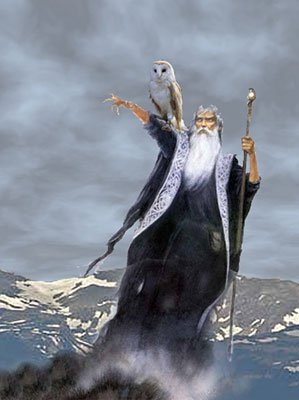
Magician (source unknown)
Words, symbols and language are “magical arts” in a sense, because they can lead to greater freedom and comprehension of reality. They can also be twisted and altered to suit a "sorcerer" mindset who can manipulate our perception and understanding of reality to keep us enslaved in false constructs and beliefs.
Think of all the fantasy fiction in movies and books; the magic was often done with spells and words they spoke. The "sorcerer" people use the magic to manipulate and control others for their own gains, while the wizard good magicians used their power for good.
Etymology reveals the true meaning of words. Words reflect something we are trying to communicate about. We use many words, and sometimes their true nature has become hidden from us. We think "anarchy" means chaos, when it's truly the representation of freedom from rulers or masters where there are no slaves. Similarly, the word "occult" has been given negative connotations like evil, dark, dangerous, etc., when it only means hidden or secret. Using either of those words in altered way, or the original way, will create a different perception of reality. The positive use of the word also gets erased and it's true meaning forgotten. Perceptions of reality can be obfuscated or distorted with the use of words.
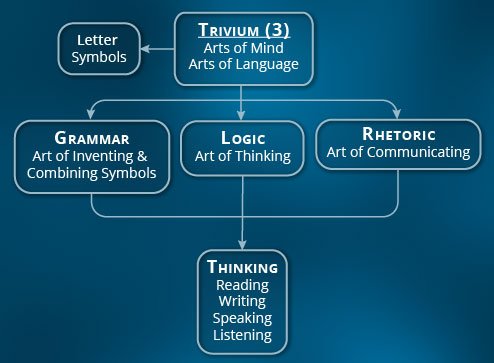
Trivium Method
Speech represents words that represent meaning. Ancient Egypt/Kemet had a term for magical or meaningful speech, "heka". Speech is the "Art of Mouth", whether it to be true of voice (maa kheru), or a silver tongue, the art can be used for right or wrong. The trivium method's rhetoric is the Art of Communication, which comes after the Art of Inventing and Combining Symbols (grammar) and the Art of Thinking (logic).
Why the mouth and speech as magic?
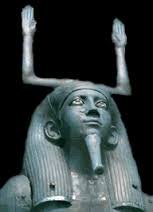
Heka (source unknown)
Heka was foundation concept and also personified as a god in Kemetian creation mythopoetic narratives. Heka represents the power of speech to change and alter the world around us through the influence and affect that word symbols have on consciousness. We make decisions and act based on the information we have, true or false. Our actions create the human world, which come from our consciousness that drives and motivates such actions. Heka is a "magical" power potential in all higher consciousness beings that can use the art of mouth to influence others.
There are many ideas that are sold where people buy into them and live accordingly. These are spells, invocations, conjurings, that are injected into consciousness through the simplicity of being heard and listened to. This is magic of the highest kind, imperceptible, hidden, mysterious, unless you know how to see and hear what is being done to you.
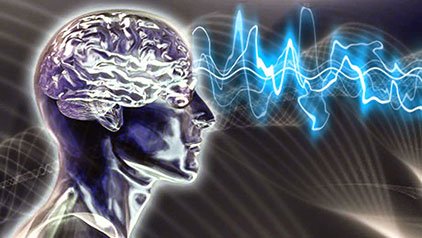
Influence (source unknown)
The magic of word symbols, "magical phrases" or buzz words, can be used as opiates to fearful masses. Make people "feel-good", love-bomb them, and you can more easily gain their trust, loyalty, faith and belief in you as someone to listen to and follow in life. "Spiritual" gurus have this effect on people, whether intended or not. This is what politicians do with their sophistry and rhetoric to lie and manipulate people's consciousness into certain behaviors. The entertainment industry, television, "gurus", politicians, priests, and more, can all amaze, mesmerize, hypnotize, induce, summon and invoke beliefs and altered states of consciousness to entrain us into specific modalities of living.
Everything you hear and see, from other people speaking, what they do, the media, and everything else in your socio-environmental scope of perception, is affecting you from the day you are born until the day you die, and it all shapes you into who you are and who you become. Knowing what words mean is important.
“The limits of my language mean the limits of my world.”
– Ludwig Wittgenstein
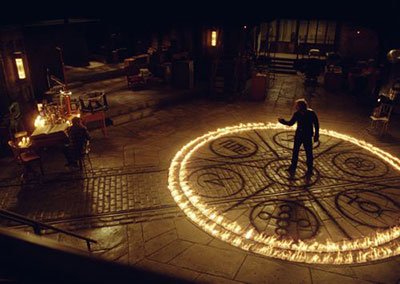
Incantation (source unknown)
Consciousness is powerful. Words are powerful. Spells cast on consciousness (thoughts and emotions, “mind and “heart”) are powerful mind-, thought- and emotional-control. With the magic of spells (words) and the science of imagery (symbolism), you can get people to accept falsity as truth. You can get people to accept beliefs that will change their behavior and actions to what you want them to do. This is to bend the will of others to your will (sorcery). Word symbol magic and their "spells" are a powerful and can manipulate our lives and steer us in certain directions, path and ways of living.
It sounds like fictional magic and fantasy, but it's all done with the power of consciousness and symbols. Etymology gives us the power to be masters of the name, to know the true name, meaning and definition for an aspect of reality is to be master of it, and not be a mere subject to it under its power as a spell cast on us.
Thank you for your time and attention! I appreciate the knowledge reaching more people. Take care. Peace.
If you appreciate and value the content, please consider:
Upvoting  , Sharing
, Sharing  or Reblogging
or Reblogging  below.
below.

Uncovering the layers of the underlying root of a word is very interesting, seeing different words with completely different meanings that have the same Latin word origin. It opens the door to share thoughts and ideas in a much more accurate and descriptive manner.
Indeed, it adds symbolic power and imagery to our ability to describe things. Thanks for the feedback, great description.
Very well written and presented. I am more and more impressed with the quality of the posts on Steemit. We have some of the brightest people around. Creative, intelligent, thoughtful. Steemit is a treasure trove.
I was just discussing with someone this morning something very closely related to your post. The Whorfian hypothesis.. the relationship between linguistics, thought and culture.
The Biblical teaching... In the beginning there was the Word and the Word was God. Takes on a new depth of interest.
Indeed, I did a post on Logos and the Word symbolism as part of a 10 post series on the power of consciousness and word symbols' effect on us. Thanks for the feedback!
I'm looking forward to your posts.
It's actually the study of the origin and changing meaning of words.
It's interesting that you quote Wittgenstein when a core point of his was that that meaning is use in Philosophical Investigations, which is a position contradictory to your own.
The root of words is really important and but I think it says more as a historical or anthropological study than as anything approaching "truth".
In terms of fantasy, have you read A Wizard of Earth-Sea? I was always fascinated by the magic system there where learning the true name of things was the way to gain power over the thing, be it animal, object or person. To that end wizards hide their true names from other wizard, because if they are in battle and their opponent finds their name out, it's basically over for them.
But only in fantasy do we find that words are "true words" in any sense.
The definition may be complex indeed, we don't write down elaborate descriptions of everything in defining them. The words are still created with a purpose to provide meaning to sounds used to communicate about something. I use the quote to convey that language is important to convey meaning, whether you need to define it 100% fully in writing, verbally, or not, there needs to be a specific meaning applied that gives the word purpose to be used. Maybe I should stop using it, thanks for that ;)
Etymology is about tracing meaning in history, yes, to understand the true meaning of the word, as it was created with purpose to convey meaning. Preferably to it's origin. It's the true intended purpose that a word was created fro to convey meaning. It's arbitrary and can be anything written or sounded, but once imbued with meaning, it can have more added and shift, as long as it gets adopted through being pointed out what it means in reference to something. The etymology of etymology tells you what the study is intended to bring forth: the true meaning of words. Not "the Truth" or whatever hehe.
Sweet, you know Earthsea more than me hehe! Not the book for me. I saw a movie in 2004 and that symbolism had provided metaphorical imagery for how I understand language. That's not where "true words" come from. I didn't say that either. Look at the etymology of etymology "study of the true sense (of a word)". Maybe because I said "meaning" instead of "sense" that is the issue? The sense of a word is the meaning of the word, the meaning being conveyed about something through that word. And then it becomes "true words" for you, with "meaning" implied? Well like I said, origin is the birth of it, as created by anyone, but once it's created it has meaning. Imagine just deciding to change the meaning of words as you wish how that would work out? If everyone agreed to it, ok.
The point is that we have meaning applied to words, and they don't just mean anything, and when they mean more than one thing it can get confusing in certain contexts, so it's best to keep meanings that apply in different contexts to not be too dissimilar. Some languages have many more words to that each representation has it's own reference, of they try to anyways. Hindu-script or similar based language, I forget. Words are created to reflect something. A "true word" is one that reflects something accurately I guess. Like in occult, the true meaning is hidden, while the false alternate is to view it as evil, dark, etc. It takes away the power of using the word, or reading about it. The altered meaning is false because instead of conveying the original meaning, it keeps people away from knowing it. There is also an emotional effect of avoiding things that are allegedly occult or use the word occult when it's believed to be evil, dark, etc.
Thanks for the feedback, but I think we're misunderstanding each other based on semantic misunderstandings, which is about defining our terms. I think I cleared up most of it... tried to explain it anyways hehe.
Perhaps there is some misunderstanding, but I'm pretty sure we're oppositional as I assert that knowing the origin of a word, the original meaning, does not necessarily mean you know what the word "really" means. Further, there is nothing that a word "really" means beyond what you and everyone else collectively understands it to be. A logical conclusion of this is that an old meaning of a word, perhaps it's actual root, could potentially be lost to the sands of time without diminishing it's usage today (though there would be a historical loss of course).
This does happen. But you're right, you need tacit agreement of the actual speakers of the language.
I've always found it funny that there exists several institutions who take the authority of deciding what is and isn't a word and what it's meaning is. The most outrageous example is always the Académie française. They are bold enough to call their members, "The Immortals". 😱 😂 This signifies to me the audacity of the enterprise of controlling the natural flow of language. It can be done, but only under the most grandiose of projects.
More languages, and indeed much of spoken French, is not governed in any way but by the shared meaning and cultural context of the users (I say users here to extend speakers to writers, etc.). As this context changes, the language changes too. You can easily find words which have completely changed meaning, even reversed meaning over time.
That said I do not wish to be a total relativist here. It's not completely arbitrary because part of the context of language (perhaps the largest part) is what we learn and what told things mean. Perhaps the most interesting thing here though is that meaning is not strictly explicit and much is implied by actual usage, not only "book learning" or whatever formal, rigid education we undergo.
Anyway I'm going on a bit here 😅 But you get my point.
On Earth-Sea, you should read it if you have the time, the trilogy is really fantastically written by a great master of not only fantasy but scifi too. As is often the case, the book is much much much better than the movie 😜
Thanks for taking the time to respond.
LOL, the immortals. Well, "fake news" popped up, and "post-truth" went into the dictionary... so the hype and popularity can get new words added, or add meaning or change meaning to old words. But indeed, there are only a few keeper of definition like merriam-webster, oxford, etc.
I have found etymology to uncover more meaning and oppositional meaning in some cases, but also saw how it could be reflected in reality in that dual way.
It definitely starts implied or pointed to (ostensible) so that we at least know what the hell a sound means in relation to reality hehe. Dada is not mama hehe. Then abstraction and further development help. I learned most of my vocabulary by reading books though, not structured formal education which I hardly learned anything about what I now know. To get a better vocabulary, sometimes the environment of society isn't providing it, so we need to develop more on our own, and books help. I know you meant the crap in school though, and I agree hehe.
Indeed, etymology is interesting and reading is the best way to expand ones vocabulary. It's a floccinaucinihilipilification though if people don't know what you're talking about, you just come across as inaniloquent 😜
I just discovered the so-called etymological fallacy:
I wish I had discovered it sooner because I think it applies well to your argument here.
I know. Go look at the word oxygen. The word has a root that doesn't apply. There are a few like this. Does that mean I can't go look at the word compassion, sympathy and empathy and understand them more, by looking at the origin to understand it's true meaning? No... because I did, and wrote posts about it. Looking at the dictionary would not have provided the depth of understanding the word. I have written several posts in the past that are like weaving a story of meaning based on the etymology of the word I uncover and wrote about. It's too bad you don't want to understand what I'm talking about. You need to engage in the etymological discovery I suppose, I dunno... Have a good one.
That's a misrepresentation of my intentions, I spend far too much time trying to understand what you're talking about 🙃 You've done that before and it's not quite fair.
I know this fallacy doesn't go very far but it challenges your primary argument, that through etomology we can gain an insight into the "true" meaning of a word. This is a further point to show there is no such thing.
What I meant was, yes you read what I'm trying to say, but it only goes so far if you're trying to prove how false it is without even going to discover how etymology can provide greater insight into a word. You have to understand how it works by actually doing it, not reading me talk about etymology as an abstraction apart from an example. It starts with asking about what one word means, and then finding more words to link and create a canvas about how they are used to reference reality. I did it with words like analogy, balance, and then with wisdom and more. It develops.
So if you want to understand it then you have to engage in the process. It requires expanding imagery and symbolic correspondence. I know some hard left-brain intellectuals can't do it, so maybe you can't understand what I'm talking about. I probably wouldn't have years ago until my thinking became less rigid. You're still saying how the "true meaning" of words isn't found in etymology? It's just whatever the current convention thinks and says it is?
Not so. I've spent my time trying to show the counter position to yours is very strong, stronger I believe. But I said from the start that etymology can of course provide greater insight (into history or anthropology for example), just not into any essential (i.e. true) meaning. My contribution here is primarily a counter argument.
You'd do well to assume less about me, my experience and my brain! If I was easily insulted I'd think you were aim at that on purpose...
Since we're talking about it again, let me be specific on where I disagree with you. Some reiteration is unavoidable.
This is a particular bugbear of mine actually! You're missing some nuance here though. There is no "true" meaning and etymology does not help you discover it. Some people use anarchy to mean chaos. Some people use it to refer to a political ideology which is not chaotic. There is a dispute about this and the meaning of the word has power, because when someone hears about anarchists at a demonstration or whatever, they understand this to mean chaotic nihilists.
This does not mean one meaning is truer than the other, it means we have a dispute on the meaning, and in this case it's very political. It is in fact political real estate, which is something you're getting at in your original post.
The safest course of action is to choose the most original meaning one can find, but that will not stop others from using a more contemporary meaning. It's why I often start out arguments by defining terms of importance if I think it's necessary, or define them along the way before using them. Anarchy would be such a term, but for example I'd presume people know what I mean (I, specifically mean) by the word "forgotten" though.
Yes, in the sense that it's context based, and if the same context is not shared it's possible to have a discord. Usage is meaning.
The hook-up we're having is on the word true. You agree there is such as thing as "true", and "meaning", and "original", even an "original meaning", but you can't accept a "true meaning", because "original" can't be "true", or isn't always "true", that the original meaning isn't always the true meaning? So there is no true meaning then?
Fidelity to an original. That's from wikipedia. So I think I'm not the only one who understands truth/true to often relate to the original.
Anarchy, the original meaning, reflects the description of freedom from masters and rulers. Now anyone can indeed alter that state of being to think it means chaos, but does no masters or rulers actually mean chaos? No, the Aletheia, the revealing/disclosure of a truth, that no masters or rulers is freedom, has been hidden once more (Iethe). The understanding of that reality of no master or rulers as freedom has been removed, hidden, occulted and removed from truth expression. A reflection about reality has been erased, and now a falsity stands in it's place, that no masters or rulers means a state of chaos, disorder, murder, etc. No longer do people think of the reality of the state of being without rulers or masters as freedom, but the opposite of freedom where the most powerful get to rule and subjugate everyone else as slaves. The original understanding is gone. The original is the true meaning that reflects something true about reality, while the conventional new meaning is a false meaning with respect to the uncovering (Aletheia) of reality, of a truth: an ideal state of no masters or rulers is not chaos or evil with slavery, etc.
I'm trying to explain this more and more. I said "It's too bad you don't want to understand what I'm talking about. You need to engage in the etymological discovery I suppose, I dunno..." To me, the correspondences in symbolism isn't being linked because of the left-brain modality of thought, of not using the imagery invoked through the word symbols that convey meaning and linking them together. Sorry if that upsets you to say your behaving left-brain intellectually, I used to be more on that side of thinking until I developed more of an understanding of symbolism.
Looking at the dictionary you get one layer of meaning. Looking at the etymology and the roots, you get a more comprehensive understanding of the original true intent of the meaning of the word. They are created from root meaning for a reason, to expand and convey a derivative meaning based on that root.
The greater insights etymology provides, that you agree it does, goes to the uncovering (Aletheia, truth) of the original/true reflection of something that the word was created and imbued with the meaning of. Does it always matter? No... like I said for the word oxygen. But others words, I have found greater meaning by looking at the original roots, rather than the preformed conclusions of dictionaries that do a good job summarizing, but the etymology often has more that one can connect to.
There are roots to words, and those roots are the origins of the original/true meaning of the word. I won't keep arguing how original can be equated to true, because wiki has already mentioned it in addition to what I have tried to do to explain it. This is what I mean by left-brain thinking, you're focused and fixated on some specific rigid way of how that term can be used. Since the meaning of words can shift relative to time periods while using the same letters previously used for a word, then you think there can be no "true meaning". That is the fallacy. But you can think I'm the one in a fallacy for thinking true and original can equate and render original meaning and true meaning as valid in etymological discovery. You're not accepting what "true meaning" means because you'er fixated on how words can and do change to convey meaning, and we can invent any word to mean anything, therefore there can never be and never as any "True meaning" to any word.
Your failing to understand what "true meaning" even means in the context of what is being discussed, because your only looking at it form a left-brain rigid angle where it can only mean that one thing which contradicts how words are created arbitrarily. Btw, engaging in a left-brain way of thinking doesn't mean you can't or don't use right-brain modalities. It's a generalization of types of thinking that can exclude other modalities of consciousness, like pure logical thinking in contradictions only that can't see the interconnected correspondences and links that allow the symbolism to lay out a canvas of meaning to understand more deeply. Just as etymology allows for deeper understanding, start to see "true meaning" in a deeper way than purely from the look at "true" to mean one thing and not others, when it does have multiple applicability in our use of the word. Like many words, but "true" itself does have a true meaning, even if "original" wasn't originally part of it's meaning, it has been complemented onto "truth" based on similar symbolic correspondences that don't contradict (unlike the original meanings like anarchy that reflect a truth hidden by the false meaning of anarchy).
Your counter argument holds valid in some cases, but not for how there is no true meaning to be found through etymology. I explained how that happens in the word anarchy, which might be the strongest case to make and other words less evident about how there are indeed "true meanings" to words as they reflect reality accurately, compared to false meanings that obliterate understanding something about reality, like how no masters or rulers doesn't mean there is chaos. Most words have stayed the same, and the original true meaning is still the current conventional one more or less. But the roots of the words will show any deviance, which merits asking why the deviation was made to alter a word. In the case of anarchy, we can suspect that having people understand about a way of living that doesn't need masters or rulers to live with rules and be more free... well that's dangerous to the masters and rulers who want to keep their way of life.
Alter words and you alter the meaning they convey and alter the perception of reality. Etymological roots of words matter to uncover these deceptions. Etymology does, not always, but it does overall as the etymology of the word etymology states it, it does contain original and true meaning to words that more accurately reflect the meaning of something compared to a lesser accurate definition we now use.
Always good to converse with you, you make me verify what I'm talking about. But I can back it up, as I have. 10 years ago would I even of understood what I was talking about here even with me explaining it?... I doubt it... lol. But I think I did a good job to show how true and original are linked, and how there is true meaning in etymology itself. And unless I went through the various etymological journeys and discoveries I have gone through, I don't think I would be able to explain it this well either. I can because I have experienced the truth of how etymology helps uncover (Aletheia) the truth of what a word means.
Peace.
Words are powerful. What we say to ourselves and others matters.
Indeed it does.
That seemingly unimportant childs rhyme "Sticks and stones can break my bones but words can never hurt me" is dangerously untrue. Words can leave damage that lasts a lifetime.
Words are powerful.
Indeed, words are. People have underestimated the influence of words and symbols to their detriment. Thanks for the feedback.
This thread takes me back to my college days. After college (1980-1984), it became increasingly difficult for me to find people who enjoy thinking and TALKING like this. Who mentions Wittgenstein in conversation (except me)? People of steemit! Yay! I may have found a home!
The pen can be a sword, and so can the tongue, hence all the Biblical admonitions on the wisdom of silence. Even if we mean well, our words can get twisted in transit and land as barbs and missiles rather than missives.
Touche' and well played!
Excellent post. In this Orwellian world, knowing the true meaning of words is very important.
Thank you.
Thanks and you're welcome ;)
Here's a clip on newspeak that goes with this post too
Destruction of Words, Narrow the Range of Thought (NewSpeak, 1984)
Use it or lose it....
As is knowing when to use them
The mind is such a beautiful creation. It's amazing how much of an impact words can have on our thoughts!

Information overload
It's the next step after consciousness and thinking, to communicate those thoughts and reference what we are talking about. Thanks for the feedback.
Hey, no "resteem it" icon for replies?
you sound a bit like me :)
you have inspired me to post some of my word work too!
LOL. Words are great ways to inspire. They breath in new thoughts and ideas.
yes - it is valuable to know the vibrational qualities of words - beyond the sound.. but it is also valuable to know how we are without words. words are, after all, not our first language ;)
Same here!
very good! followed!
Ditto!
I like your article. You inspired me a lot.
Great. Abrakadabra! :)
Thank you @krnel. What is your analysis of the word Abrakadabra and its true origin?
Here you go, Magic, Abracadabra and the Word – The Power of Consciousness (Pt.1), a previous series on consciousness and words/language influence.
Thank very much for info and link !!!
Wow, very powerful info. Is there a Greek and/or Latin online dictionary you recommend for etymological research?
Thanks. There is etymonline and wiktionary, and other sites.